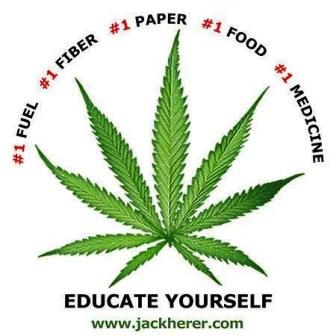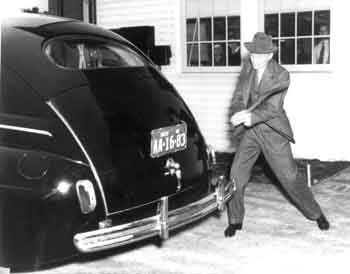 Herer's website features this graphic on uses of hemp. (Clinton, KY January 28, 2013) - When the Clinton City Council meets on Monday, Feb. 4, they will have a resolution in their packet in support of “reintroducing industrial hemp in the Kentucky Agriculture and helping make Kentucky a national leader in this agriculture crop.” This resolution was drafted and brought forth by Councilman Ivan Potter in the council’s January meeting, but was tabled so that more research could be done on the topic.
Industrial hemp is an agricultural product that can be used to produce clothing, paper, and even fuel.
“Commissioner of Agriculture James Comer and State Senator Rand Paul are both pushing the initiative to reintroduce industrial hemp as a cash crop in Kentucky,” Potter said in an interview with the Hickman County Gazette on Monday evening. Potter stated that Hickman County has weather and irrigation conditions for growing industrial hemp are among the best in the country.
“We are in line for 1,000 jobs,” Potter stated optimistically. He said that since the Hickman County area is so ideal for growing industrial hemp, the region would also be good location for plants to process the product. According to Potter, the region would be prime for a garment factory that would use hemp as a raw material instead of cotton. A factory like this could employ 200 to 300 locals.
In addition to the garment factory, the region would be a prime location for a large paper mill that would use hemp instead of timber. This type of factory could produce up to 800 jobs. “These figures are based on a report from the University of Kentucky about 10 years ago when they did a study on the potential impact of industrial hemp in western part of the state,” Potter said.
Potter is attempting to convince the rest of the Clinton City Council to be the first unit of government on this side of the state to pass a resolution in support of growing industrial hemp for economic development purposes. On the farming side of the situation, Potter said that it would be similar to introducing tobacco agriculture. If a farmer wanted to grow hemp, they would have to register with the state police and the commissioner of agriculture, and they would be monitored around the clock to ensure there would be no illegal practices.
Why is it illegal now?
According to a popular non-fiction work by Jack Herer entitled The Emperor Wears No Clothes, The first laws regarding hemp in America were introduced in the 1600 by the British Colonial Government. These were “must grow” laws, and they required farmers to grow hemp, as it was at the time the most widely used plant in the world. Farmers that didn’t grow hemp could be jailed or kicked out of the country as a non-patriot. Benjamin Franklin started the first paper mill in America and it used hemp to produce all of its paper.
The first law against hemp was passed in 1937, and potential reasons for the ban vary depending on who is asked. According to Potter, Henry  Ford was at the time building prototype automobiles out of hemp fiber, and some big industries in America became nervous and began promoting propaganda against hemp. Potter said that the hemp ban was lifted during World War II and the Hickman County area grew hemp to make rope for the Navy. Ford was at the time building prototype automobiles out of hemp fiber, and some big industries in America became nervous and began promoting propaganda against hemp. Potter said that the hemp ban was lifted during World War II and the Hickman County area grew hemp to make rope for the Navy.
What is the difference between industrial hemp and marijuana?
According to the website industrialhemp.net, “Even though they both come from Cannabis sativa L., the varieties that are used to make Industrial Hemp products (seed, fiber, etc.) and those that are used to make marijuana (flowering tops and leaves) are distinctly different. They are scientifically different and are cultivated in very different ways.”
“The purpose of the proposed resolution is to communicate to officials in Frankfurt that there is an enlightened city council that wants to pursue industrial hemp for industrial benefit,” Potter said.
Some facts about hemp from Hempethics.com:
• Industrial hemp contains only about 0.3% - 1.5% THC (Tetrahydrocannabinoids, the intoxicating ingredients that make you high) while marijuana contains about 5% - 10% or more THC.
• Hemp fibre is the longest, strongest and most durable of all natural fibres.
• Hemp cultivation requires no chemicals, pesticides or herbicides.
• Grown in rotation with other crops such as corn and legumes, hemp farming is completely sustainable. Hemp produces four times as much fibre per acre as pine trees.
• Hemp tree-free paper can be recycled up to seven times, compared with three times for pine-pulp based papers.
For additional information on hemp, see "Hemp, a New Crop with New Uses for North America, by Ernest Small and David Marcus
http://www.hort.purdue.edu/newcrop/ncnu02/v5-284.html |



 Ford was at the time building prototype automobiles out of hemp fiber, and some big industries in America became nervous and began promoting propaganda against hemp. Potter said that the hemp ban was lifted during World War II and the Hickman County area grew hemp to make rope for the Navy.
Ford was at the time building prototype automobiles out of hemp fiber, and some big industries in America became nervous and began promoting propaganda against hemp. Potter said that the hemp ban was lifted during World War II and the Hickman County area grew hemp to make rope for the Navy.



